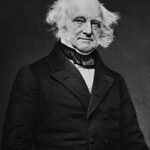The Fateful Decision
Martin Van Buren’s rejection of immediate Texas annexation became his political death sentence. The former president opposed adding Texas as a slave state in 1844. He feared it would ignite sectional tensions over slavery expansion. Van Buren also worried about potential war with Mexico over disputed territories. ⚠️ This stance directly contradicted his party’s growing expansionist fever.
Breaking Party Unity
Van Buren Texas annexation opposition shattered Democratic Party solidarity. Southern Democrats demanded Texas statehood to expand slavery westward. Western Democrats craved territorial expansion for economic opportunities. Van Buren’s anti-annexation letter with Henry Clay backfired spectacularly. It appeared as Washington insider collusion against popular will. 📊 The decision cost him crucial delegate support at the 1844 Democratic Convention.
The Political Calculation Gone Wrong
Van Buren believed opposing Texas annexation would preserve national unity. He thought avoiding war with Mexico was worth political sacrifice. The former president miscalculated his party’s expansionist appetite completely. 💰 Democrats saw Texas as economic opportunity and manifest destiny fulfillment. Van Buren’s moral stance on slavery expansion seemed outdated to many supporters.
Impact:
Immediate Political Destruction
Van Buren Texas annexation rejection destroyed his 1844 presidential nomination hopes instantly. Southern Democrats abandoned their former leader en masse. The party convention deadlocked over his candidacy for multiple ballots. Dark horse candidate James K. Polk emerged as the compromise nominee. 🔥 Van Buren’s political career effectively ended at that convention moment.
Democratic Party Fractures
The annexation controversy exposed deep Democratic Party fault lines permanently. Northern Democrats split between anti-slavery and expansionist factions. Southern Democrats questioned party loyalty to their slavery interests. Van Buren’s decision accelerated the party’s sectional divisions significantly. These fractures would eventually contribute to Civil War tensions. 📉 The unified Jacksonian coalition never fully recovered from this split.
Long-term Historical Consequences
Van Buren’s stance foreshadowed the Free Soil Party formation in 1848. His opposition to slavery expansion influenced Northern anti-slavery movements. The decision demonstrated how slavery questions dominated American politics increasingly. Texas eventually joined the Union under Polk’s presidency anyway. 🌍 Van Buren’s sacrifice failed to prevent the Mexican-American War or slavery’s expansion westward ultimately.
